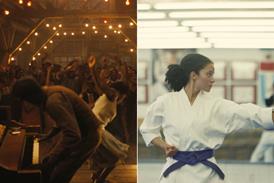Dir. Pamela Yates, USA, 2009, 100 minutes
The Reckoning looks inside the International Criminal Court and its efforts to prosecute those who commit crimes against humanity, showing the challenges of uniting the world community to act, even on mass murder. Pamela Yates's probing film should have a strong run on the festival circuit and then play on public television or cable channels in Europe and the US (which is not a member of the court). School and university markets are another opportunity. Although it's an evidently important popular source on the subject, the film does risk being put out of date by a major new trial or investigation.
Yates's own investigation opens with the establishment of the ICC in 2002, four years after the decision was made to create it. Prosecutors and investigators examine places where the worst crimes against humanity have been committed - northern Uganda, Congo, and Sudan, for example. The court has no police force to make arrests, and relies on local agents.
AS ICC staff housed in a sterile building in the Hague discuss their uphill battles - in talking-head style -footage from the field implicates the defendants and surveys the grim toll on their victims.
This detailed evidence is hard to watch. In Congo and Uganda, whole armies are formed of abducted children who are forced to kill. Often the first victims are their own relatives, and the huge death count is seen in piles of corpses. In those same countries, girls are forced to be sex slaves. The numbers are staggering and testimony from victims and the young killers is heartbreaking. The interviews, either at the ICC or in the field, are vividly shot by Melle van Essen.
Being a court, the ICC operates with a presumption of innocence (a notion that seems to clash with the glaring evidence that Yates documents) and offers the protection of due process to the warlords who come before it. Their lawyers predictably question every charge and deny the court's authority. An African rebel leader accused of mass killings laments to the court that prison is unpleasant.
You see how slowly the wheels of justice move. The ICC's chief prosecutor, Luis Moreno-Ocampo of Argentina, whom Yates accompanies through her documentary, listens with incredulity as representatives of Sudan's allies testify at the UN that prosecuting Sudan's president for atrocities in Darfur would delay bringing peace to the region. Another lawyer for the ICC tells Yates with frustration that the court receives piles of letters begging for help from around the world - '90 % of them are asking for things we can't do.'
As Yates tours world crises, the US emerges as another obstacle. Washington has refused to be part of the ICC, former UN ambassador John Bolton explains, because it opposes any efforts to make its own leaders accountable to the court.
Without US support, the court struggles to exert its authority in places like Colombia, and Yates shows that the entire enterprise of fighting genocide is a work in progress. The evidence that she presents makes it all the more crucial.
Production companies
Skylight Pictures
International Center for Transitional Justice
International Sales
Films Transit International
+ 514 844 3358
US Distributor
Skylight Pictures
Producer
Paco de Onis
Cinematographer
Melle van Essen
Editors
Peter Kinoy
Dara Kell
Music
Roger C. Miller



















No comments yet